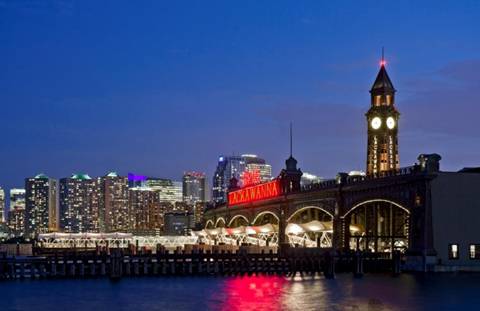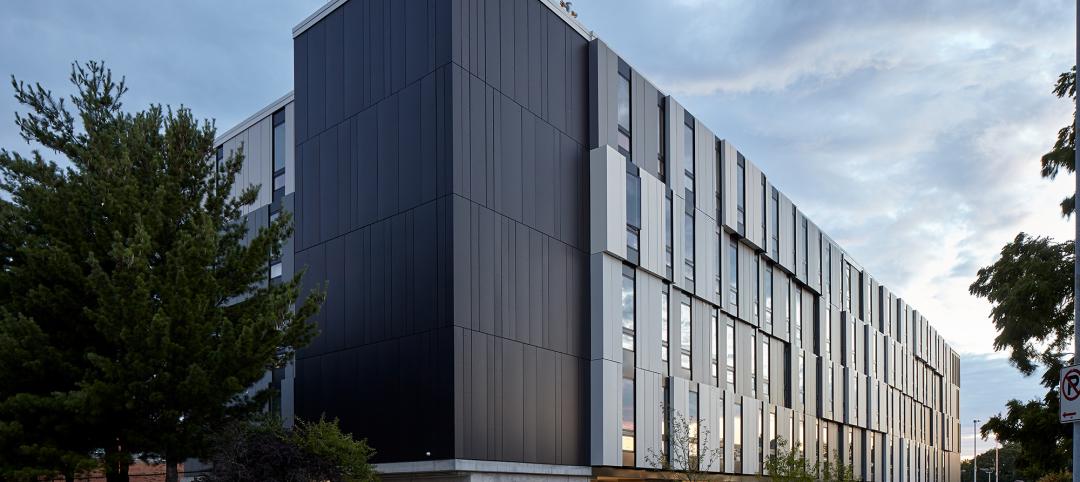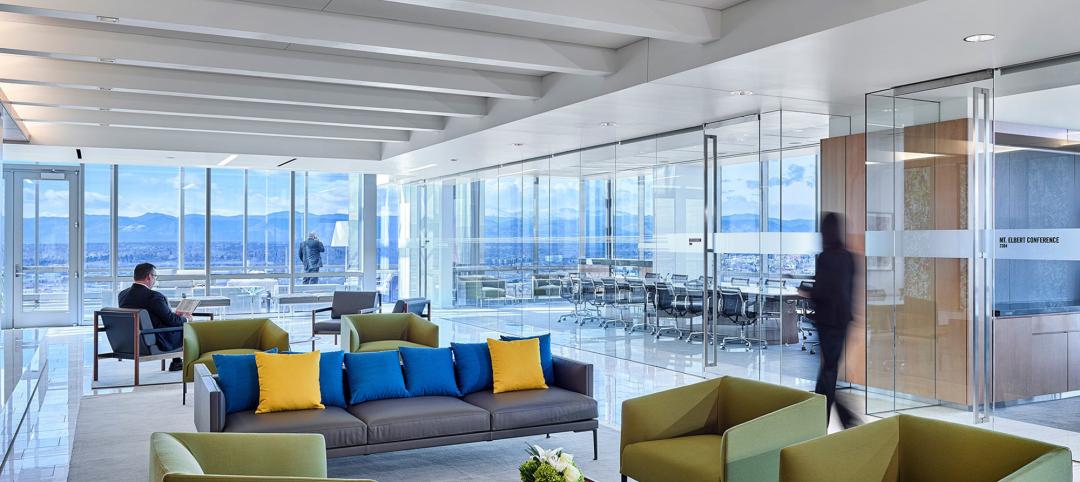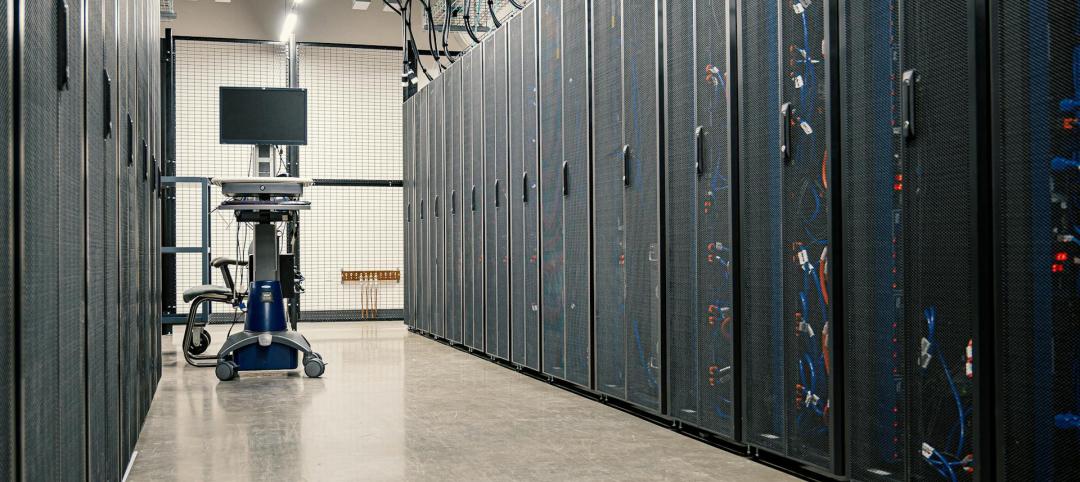New Jersey Department of Transportation Commissioner and NJ TRANSIT Board Chairman James Simpson and NJ TRANSIT Executive Director James Weinstein joined local, state and federal officials recently celebrated the completion of a project that returned a portion of Hoboken Terminal to its original design—restoring permanent ferry service to the historic building.
The historic, Beaux-Arts style terminal and its ferry slips were originally built by the Delaware, Lackawanna and Western Railroad in 1907. Hoboken ferry service was discontinued in 1967 due to declining demand, but was reintroduced in 1989 at a temporary facility at the southern end of the terminal building.
In early 2003, NJ TRANSIT and the Port Authority entered into an agreement to allow for the restoration of the Hoboken Terminal ferry slips and supporting infrastructure, with the goal of returning ferry service to its original location, while protecting and enhancing the historic elements of the terminal.
The $120 million project, funded through a mixture of state, federal and Port Authority funding, was divided into three phases. The first phase, which began in April 2004 and was completed in September 2005, included repairs to the terminal’s substructure and superstructure.
Work on the second phase began in December 2005 and was completed in April 2008, including construction of a 230-foot tall clock tower replica modeled after the original 1907 design by architect Kenneth Murchison. In homage to the original, the clock tower includes four-foot-high copper letters spelling out the word “Lackawanna” and is surmounted by an illuminated clock with four 12-foot diameter faces, one on each side of the tower.
The second phase also included marine construction of five of the original six ferry slips, as well as restoration of the exterior copper facade and lighting on the river side of the terminal, structural repairs, roof repairs and demolition of the finger piers and wooden fenders.
Construction of the ferry boarding area was completed in the third and final phase, along with all remaining work necessary to restore ferry service to the original slips, including work on utilities, lighting, the ticketing area, ferry barges and gangways.
NY Waterway, owned and operated by Port Imperial Ferry Corp and Billybey Ferry Co., will be providing service from the ferry slips. NY Waterway provides the largest privately-owned commuter ferry service in the U.S., carrying 35,000 passenger trips per day – 8 million trips per year, including service between New Jersey and Manhattan.
Hoboken Terminal currently provides travelers multiple transit options including commuter rail, light rail, bus, PATH and ferry service. Nearly 60,000 people use the terminal on a typical weekday. BD+C
Related Stories
Curtain Wall | Aug 15, 2024
7 steps to investigating curtain wall leaks
It is common for significant curtain wall leakage to involve multiple variables. Therefore, a comprehensive multi-faceted investigation is required to determine the origin of leakage, according to building enclosure consultants Richard Aeck and John A. Rudisill with Rimkus.
MFPRO+ News | Aug 14, 2024
Report outlines how Atlanta can collaborate with private sector to spur more housing construction
A report by an Urban Land Institute’s Advisory Services panel, commissioned by the city’s housing authority, Atlanta Housing (AH), offered ways the city could collaborate with developers to spur more housing construction.
Adaptive Reuse | Aug 14, 2024
KPF unveils design for repositioning of Norman Foster’s 8 Canada Square tower in London
8 Canada Square, a Norman Foster-designed office building that’s currently the global headquarters of HSBC Holdings, will have large sections of its façade removed to create landscaped terraces. The project, designed by KPF, will be the world’s largest transformation of an office tower into a sustainable mixed-use building.
Sustainability | Aug 14, 2024
World’s first TRUE Zero Waste for Construction-certified public project delivered in Calif.
The Contra Costa County Administration Building in Martinez, Calif., is the world’s first public project to achieve the zero-waste-focused TRUE Gold certification for construction. The TRUE Certification for Construction program, administered by Green Business Certification Inc. (GBCI), recognizes projects that achieve exceptional levels of waste reduction, reuse, and recycling.
Modular Building | Aug 13, 2024
Strategies for attainable housing design with modular construction
Urban, market-rate housing that lower-income workers can actually afford is one of our country’s biggest needs. For multifamily designers, this challenge presents several opportunities for creating housing that workers can afford on their salaries.
University Buildings | Aug 12, 2024
Planning for growing computer science programs
Driven by emerging AI developments and digital transformation in the business world, university computer science programs are projected to grow by nearly 15% by 2030.
Energy Efficiency | Aug 9, 2024
Artificial intelligence could help reduce energy consumption by as much as 40% by 2050
Artificial intelligence could help U.S. buildings to significantly reduce energy consumption and carbon emissions, according to a paper by researchers at the Lawrence Berkeley National Laboratory.
Sponsored | Healthcare Facilities | Aug 8, 2024
U.S. healthcare building sector trends and innovations for 2024-2025
As new medicines, treatment regimens, and clinical protocols radically alter the medical world, facilities and building environments in which they take form are similarly evolving rapidly. Innovations and trends related to products, materials, assemblies, and building systems for the U.S. healthcare building sector have opened new avenues for better care delivery. Discussions with leading healthcare architecture, engineering, and construction (AEC) firms and owners-operators offer insights into some of the most promising directions. This course is worth 1.0 AIA/HSW learning unit.
Office Buildings | Aug 8, 2024
6 design trends for the legal workplace
Law firms differ from many professional organizations in their need for private offices to meet confidentiality with clients and write and review legal documents in quiet, focused environments
Data Centers | Aug 8, 2024
Global edge data center market to cross $300 billion by 2026, says JLL
Technological megatrends, including IoT and generative AI, will require computing power to be closer to data generation and consumption, fueling growth of edge IT infrastructure, according to a new JLL report.

















